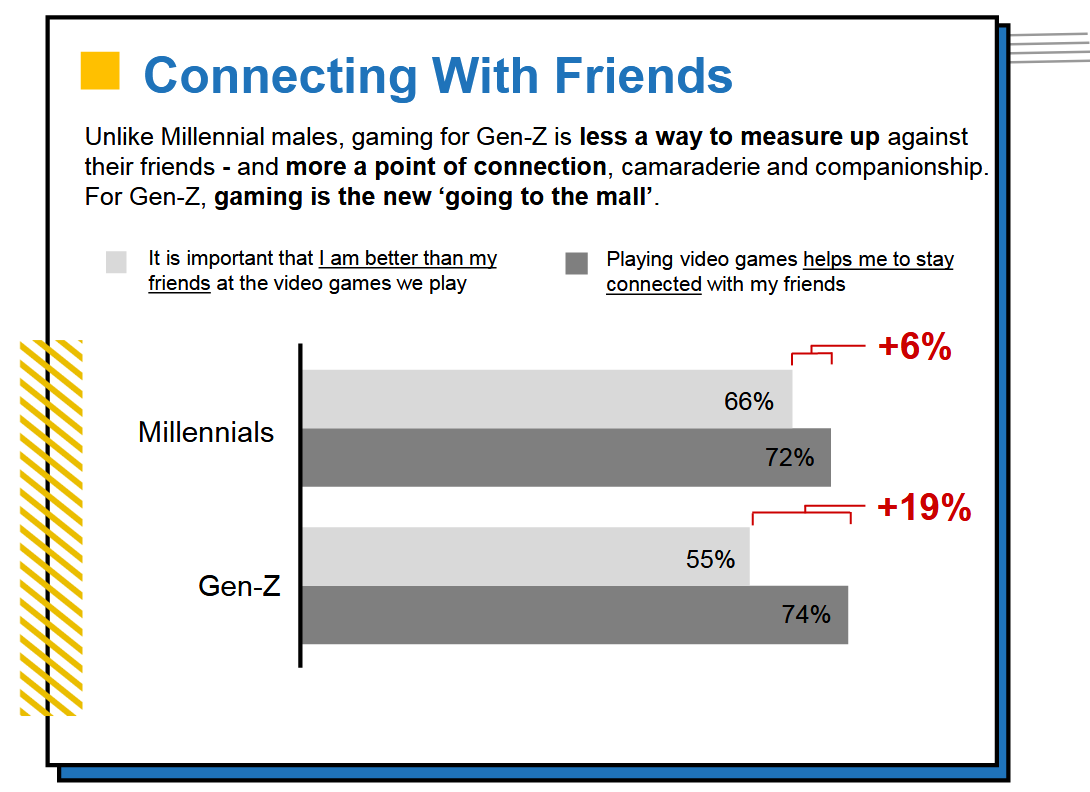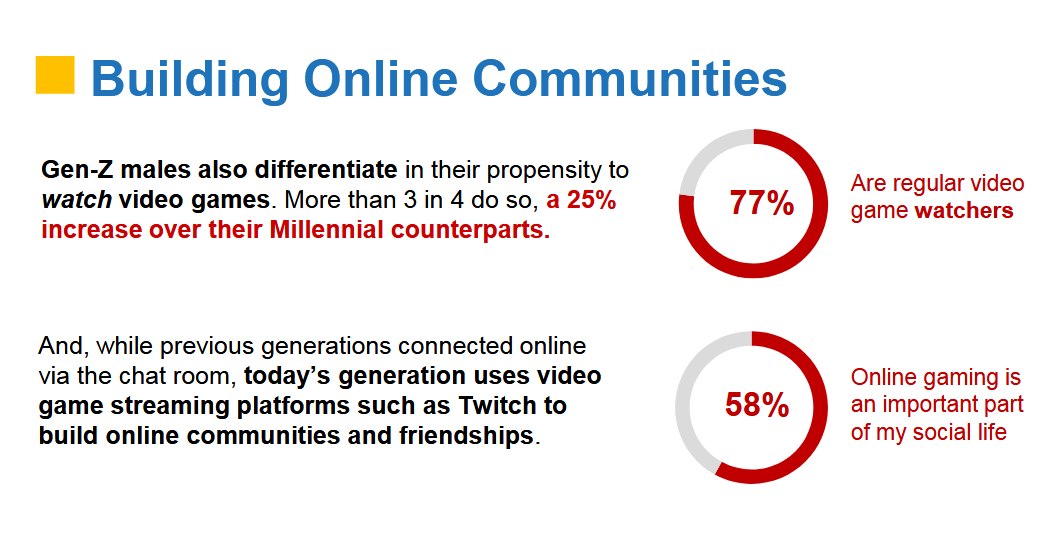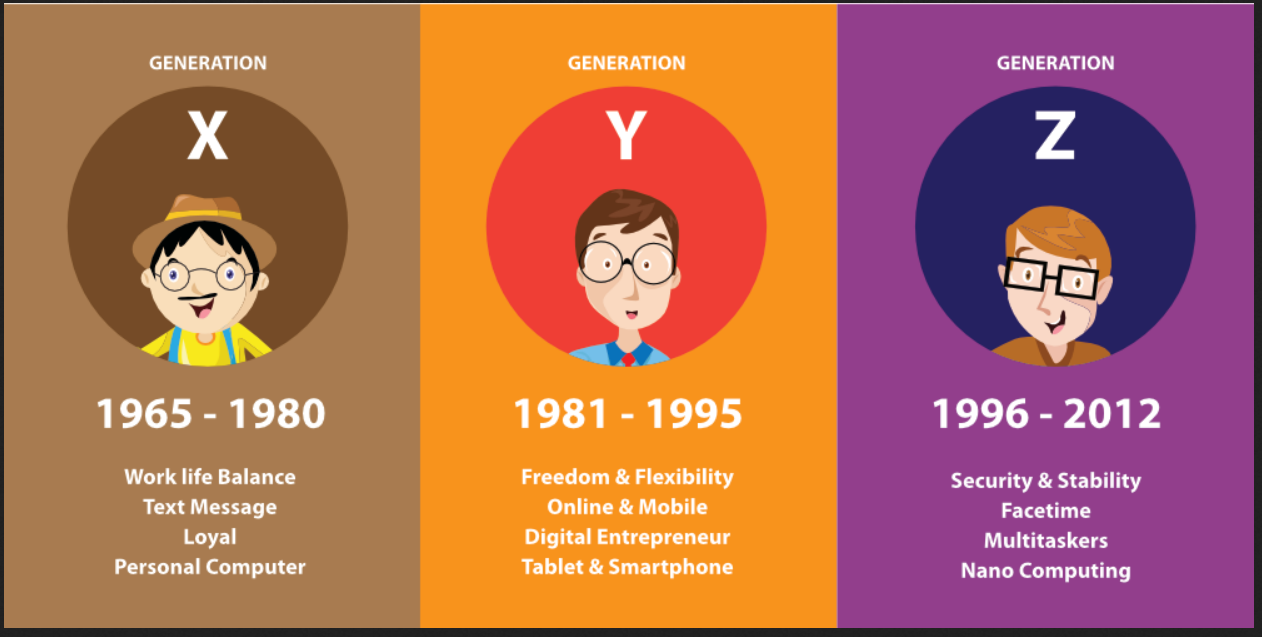[ENG/ESP] Video game trends of the future: Millennials are more competitive than Generation Zeta. / Las tendencias de los videojuegos en el futuro: los Millennials son más competitivos que la Generación Zeta.

I am finishing this series of articles dedicated to gaming trends in 2022 that I started with a commentary on the remarkable advance of online gaming over the last 2-3 years in all aspects: players, players, players' players, technology, new and increasingly complex games, the rise of eSports and many other aspects that have determined a level of business never seen before in the history of online gaming.
The second post was dedicated to the irruption of 5G in the gaming market totally changing not only the way of playing but also the quantity and quality of players and spectators that approach this new virtual world, the fight between PlayStation and xBox the two main gaming consoles that have ruled - and monopolised - this market sector for years and decades.
The third article instead referred to mobile gaming and the new role of players and spectators in today's gaming that has led to a constant interest in learning to play professionally with a truly exponential growth in the number of spectators.
With this penultimate post dedicated to the trend of gaming in the future I intend to close this series of comments and analysis from someone who is not a professional but a simple gaming enthusiast and more than that, still, a scholar of the remarkable effect -social and economic- that they have on the whole of modern society.
Today I will focus on the "controversy" between Millennials and Generation Zeta.


Estoy terminando esta serie de artículos dedicados a la tendencia del gaming en este 2022 que inicié con un comentario sobre el notable avance de los juegos online a lo largo de los últimos 2-3 años en todos los aspectos: jugadores, espectacdores, tecnología, nuevos juegos cada vez más complejos, el auge de los eSports y muchos aspectos más que han determinado un nivel de negocios nunca antes visto en la historia de los juegos online.
El segundo post lo dediqué a la irrupción del 5G en el mercado del juego cambiando totalmente no solo el modo de jugar sino la cantidad y calidad de jugadores y espectadores que se acercan a este nuevo mundo virtual, a la lucha entre PlayStation y xBox las dos principales consolas de juegos que han regulado -y monopolizado- este sector del mercado por años y décadas.
El tercer artículo en cambio se refería a los juegos para los móviles y al nuevo rol de jugadores y espectadores en el gaming actual que ha llevado a un interés constante por aprender a jugar en forma profesional con un número de expectadores en un crecimiento verdaderamente exponencial.
Con este penúltimo post dedicado a la tendencia del gaming en el futuro pretendoir cerrando esta serie de comentarios y análisis de alguien que no es un profesional sino un simple aficcionado a los juegos y más que eso, aún, un estudioso del notable efecto -social y económico- que proyectan sobre la entera sociedad moderna.
Hoy me dedicaré a la "controversia" entre Millennials y Generación Zeta.
Millennials are becoming major players in competitive gaming. / Los Millennials se convierten en protagonistas principales en los juegos a nivel competitivo.

The "Millennials", i.e. the generation born between 1981 and 1993 - although some authors extend this period to 1995 - are gamers between 26 and 40 years of age, as opposed to the so-called "Generation Z", and have become the main protagonists of online gaming, which marks a new and novel trend.
A recent survey conducted by Whistle showed that 66% of Millennials see gaming as a type of activity that is no longer for distraction or entertainment, but rather directly competitive, which increasingly leads to the professionalisation of gaming.
While Zeta Generation gamers only share this opinion in 55% of cases and consider gaming more important as entertainment among friends.
And here is the first contradiction in the way of thinking of many people who are closely linked to a traditional concept of thinking.
Younger people are considered to be more innovative, yet Generation Z (between 1996-1997 and 2016, i.e. today they are between 6 and 24 years old) consider gaming as a social function of entertainment rather than professional development, to the extent that they use gaming communities such as Twich for the sole purpose of making new friends and sharing knowledge about games, accounting for 77% of gamers. If we look at the percentages clearly, we can say that 3 out of 4 gamers of the Zeta Generation prefer to consume videos about games on Twich or Youtube as a simple form of amateur entertainment.


Los "Millennials", es decir la generación nacida entre los años 1981 y 1993 -aunque algunos autores extiendan este plazo hasta el año 1995-, son los jugadores que tienen entre 26 y 40 años de edad aproximadamente, en contraposición con la llamada “Generación Z“, y han pasado a convertirse en los principales protagonistas de los juegos online, lo que marca una nueva y novedosa tendencia.
En un recente estudio-encuesta realizado por Whistle quedó demostrado que el 66% de los Millennials ven al gaming como un tipo de actividad no ya de distracción o entretenimiento sino directamente competitiva, lo que lleva cada vez más a la profesionalización del gaming.
Mientras que los jugadores de la Generacioón Zeta solo comparten esa opinión en el 55% de los casos y consideran más importante el gaming como entretenimiento entre amigos.
Y aquí se presenta el primer contrasentido en el modo de razonar de muchas personas estrechamente ligadas a un concepto tradicional del pensamiento.
Se considera que las personas más jóvenes son más innotativas y sin embargo la Generación Z (comprendida entre los años 1996-1997 y 2016, es decir que hoy tienen entre 6 y 24 años) consideran al gaming más que nada como una función social de entertenimiento y no de desarrollo profesional, a punto que usan comunidades de juegos como las de Twich con el único fin de hacer nuevas amistades y compartir conocimientos sobre los juegos, llegando a representar el 77% de jugadores. Si pasamos los porcentajes en claro podemos decir que 3 de cada 4 jugadores de la Generación Zeta prefiere consumir videos sobre juegos en Twich o Youtube como simple modo de entretenimiento amateur.

Professionalising the game also means - fundamentally - obtaining an economic benefit from it.
We are a long way from the years when the economic interest in gaming was limited to online pokers and similar games. Nowadays, the constant professionalisation of the game has given rise to much more sophisticated variants, and therefore, much more numerous, with the direct interference of the blockchain in them.
This has led to a resizing of gaming technology with the new 5G, and to a substantial change in the role of players and spectators in this new "digital economy".
The behavioural patterns that serve to identify the new generations have changed, and this has helped large companies, independent developers and the blockchain in general not only to promote the massive use of cryptocurrencies in a new sector of the digital economy, but also to generate an impressive business.
It is therefore important to define which generation has the most economic relevance. It is not just a game. It is about bringing to the market a sector that generates a business worth millions of dollars a year.
And that should not diminish or stagnate, but on the contrary, increase more and more.
What will be its real ceiling? Time and technology will tell.

Profesionalizar el juego significa también -fundamentalmente- obtener un beneficio económico a través de él.
Lejos estamos de los años en los cuáles el interés económico del gaming se limitaba a los pokers on line y juegos similares. En la actualidad la constante profesionalización del juego ha dado lugar a variantes mucho más sofisticadas, y por lo tanto, mucho más numerosas, con la directa injerencia de la blockchain en los mismos.
Lo que ha llevado a redimensionar la tecnología de los juegos con el nuevo 5G, y a modificar sustancialmente el rol de jugadores y espectadores en esta nueva "economía digital".
Los patrones de comportamiento que sirven para identificar las nuevas generaciones han cambiado, y eso ha servido para las grandes empresas, para los desarrolladores independientes y para la blockchain en general no solo para promover el uso masivo de las criptomonedas en un nuevo sector de la economía digital sino también a general para entender un nuevo business de negocios impresionante.
De ahí que sea importante definir que generación tiene más relevancia a nivel económico. No es solo un juego. Es incoorporar al mercado un sector que genera un business de millones de dólares al año.
Y que no tiene disminuir o estancarse, sino por el contrario, aumentar cada vez más.
Cuál será su verdadero techo? El tiempo y la teconología mediante lo dirán.











Comments